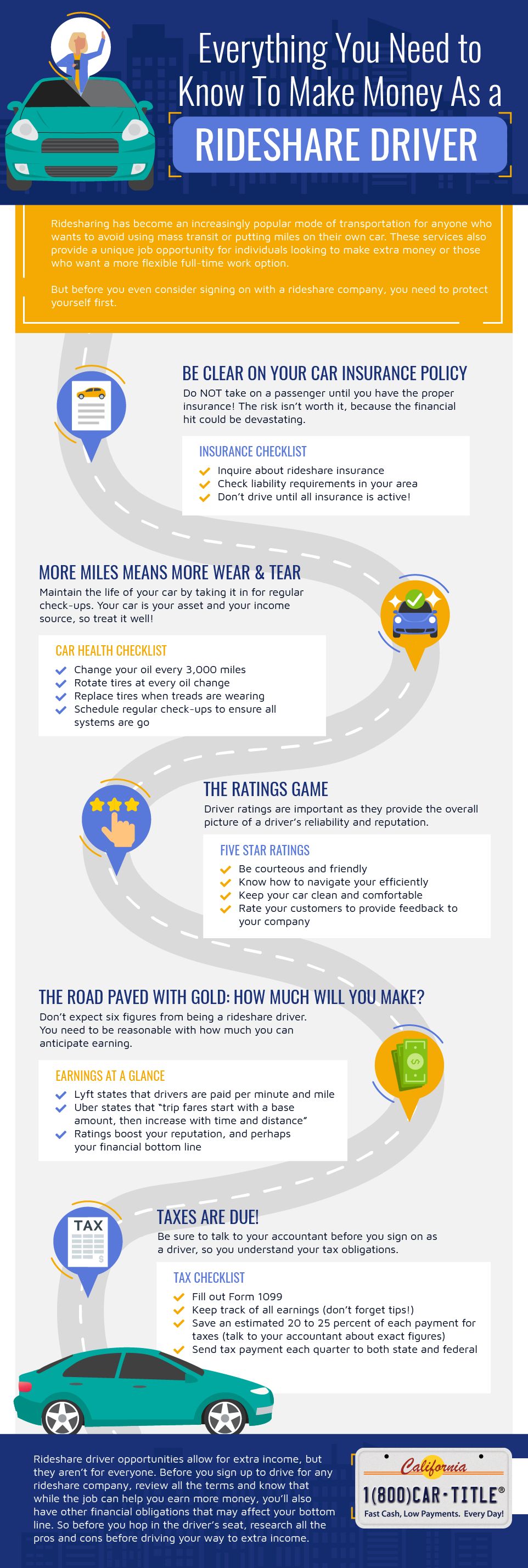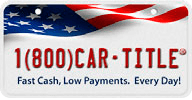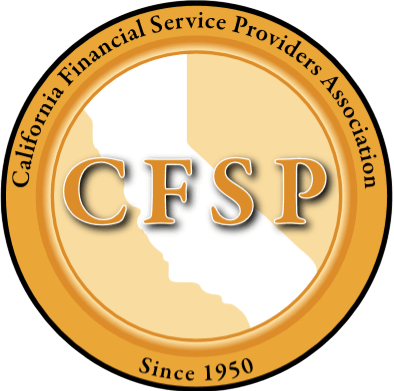Everything You Need to Know To Make Money As a Rideshare Driver
By carloansadmin • October 9, 2018
Ridesharing has become an increasingly popular mode of transportation for anyone who wants to avoid using mass transit or putting miles on their own car. These services also provide a unique job opportunity for individuals looking to make extra money or those who want a more flexible full-time work option.
If you’re eager to take the driver’s seat in a ridesharing career, though, there are a few things you need to know before you pick up your first passenger. First, some cities don’t even allow rideshare drivers to operate; check your local laws and mandates before you pursue this opportunity! Most rideshare companies also require drivers be 21 or over, pass a background check and have an iPhone or an Android.
While ridesharing services can provide an extra source of cash flow, this opportunity isn’t as easy as setting the cruise control. According to Ridester, Uber’s co-founder Garrett Camp was quoted as saying that Uber has about two million drivers. This is only Uber’s figure—which is probably higher in 2018—and doesn’t account for drivers representing competitors like Lyft and even smaller startups like Getaround. This means that in any given city, competition may be fierce.
Starting out, your reputation as a driver—or your driver rating—may be nonexistent and it might take you longer to score passengers and make meaningful money.
But before you even consider signing on with a rideshare company, you need to protect yourself first.

Be Clear On Your Car Insurance Policy
Driving for a rideshare company comes with risk and liability, because, if you’re taking on passengers, you’re responsible for their safety. You absolutely need to call your insurance company to discuss any additional coverage you might need. When your vehicle is your business, some liability issues might not be covered under your current policy. So your automobile insurance must be informed that your car is now serving as a rideshare business.
Insurance requirements and liability coverage may differ from state to state. Many insurance companies offer policies or policy riders for rideshare drivers, because as Geico’s site notes “most personal auto policies exclude ‘drive for hire.’” The liability risks soar when you take on passengers, so be sure that you’re fully insured and that you have enough coverage. Rideshare companies also may offer insurance options to drivers. Do NOT take on a passenger until you have the proper insurance! The risk isn’t worth it, because the financial hit could be devastating.
Insurance Checklist
● Inquire about rideshare insurance
● Check liability requirements in your area
● Don’t drive until all insurance is active!
However, liability and financial risk isn’t just confined to the passengers in your backseat because your car also is at risk every time you drive.
More Miles Means More Wear & Tear
Your car is your biggest asset when you drive for a rideshare company. Yet, every drive you accept puts more wear on your car. This could lead to extra costs like frequently replacing tires, more oil changes or even expensive repairs. Also, if your car is a lease, you also may run the risk of overextending your mileage or breaking the lease agreement.
If you’re determined to become a driver, keep track of mileage to ensure that oil changes are timely. Also, maintain the life of your car by taking it in for regular check-ups. Rotate your tires as recommended and be sure to buy new tires once the tread is wearing down. Your car is your asset and your income source, so treat it well!
Car Health Checklist
● Change your oil every 3,000 miles
● Rotate tires at every oil change
● Replace tires when treads are wearing
● Schedule regular check-ups to ensure all systems are go
When your car is ready for the road—and your passengers—it’s time to drive so you can begin to build up great driver ratings!
The Ratings Game
So what are driver ratings? Every time you pick up a passenger, they can rate their experience with you—the driver. According to Uber’s web site, ratings may be impacted by communication, how clean you keep your vehicle and your navigation (as in, did you know the area). Other factors also may contribute to an overall rating. The system is set up based on five stars, and a driver’s overall rating lets passengers get a feel for the driver. However, drivers also can rate their passengers to provide feedback on the experience as well.
Lyft also encourages both passengers and drivers to rate each other, and passengers also can leave extra comments about their driver and the experience. Driver ratings are an average of a driver’s “last 100 ratings” or, for newer drivers, the average of all current ratings. Drivers also rate passengers, and if the experience was a poor one, this allows Lyft to make sure the driver isn’t paired with the passenger again.
Driver ratings are important as they provide the overall picture of a driver’s reliability and reputation. Uber’s site states that if a driver’s rating falls too low, they are given tips to improve their rating. If it falls below the acceptable area average, the driver may have their account deactivated, but Uber notes that this is the last resort option.
Five Star Ratings
● Be courteous and friendly
● Know how to navigate efficiently
● Keep your car clean and comfortable
● Rate your customers to provide feedback to your company
So what if your ratings are amazing? Do ratings impact how much you will make? And how much can a driver expect to make?
The Road Paved With Gold: How Much Will You Make?
High ratings will make you more desirable to riders. You may see a boost of requests, which, of course, impacts your financial bottom line. But don’t expect six figures from being a rideshare driver. You need to be reasonable with how much you can anticipate earning.
According to statistics from SherpaShare that was referenced on Bankrate, 56 percent of rideshare drivers earned $10,000or less in 2017. However, some drivers do extremely well and can make much more money. The takeaway, though, is that rideshare opportunities may be best suited as second job options or as a means to supplement income. Keep your day job and use the opportunity as an extra boost!
Earnings at a Glance
● Lyft states that drivers are paid per minute and mile
● Uber states that “trip fares start with a base amount, then increase with time and distance”
● Ratings boost your reputation, and perhaps your financial bottom line
Taxes are Due!
Be sure to have an accountant on hand who can calculate quarterly tax estimates—both state and federal. Rideshare drivers are contract workers, and this means that taxes are not deducted from your earnings. You are responsible for tracking your income and sending in tax payments. Since taxes are due every quarter, you may want to save about 20 to 25 percent of your earnings so that you have enough money for tax payments. Paying taxes quarterly helps ensure that you don’t have a huge bill at the end of the year or the payments may just boost your refund (depending on your tax situation). And, yes, tips are part of your taxable income, so don’t forget to keep track of all tips!
Be sure to talk to your accountant before you sign on as a driver, so you understand your tax obligations.
Tax Checklist
● Fill out Form 1099
● Keep track of all earnings (don’t forget tips!)
● Save an estimated 20 to 25 percent of each payment for taxes (talk to your accountant about exact figures)
● Send tax payment each quarter to both state and federal
Rideshare driver programs provide those looking for extra money with an easy source of income. Drivers can choose their own schedule, and this flexibility allows for cash flow opportunities even during late-night hours. However, income isn’t always predictable and new drivers need to build their personal reputation. Driver ratings may lead to more opportunities, and, in turn, more cash flow. But remember that any money you make as a driver must be tracked for tax purposes. Drivers are contractors, and this means that taxes are not withheld. All drivers must be sure they have the proper insurance coverage to operate, because once the car becomes your business more liability incurs. Talk to an insurance agent about any extra coverage you need. Also, understand that all the miles you put on your car often leads to more frequent repairs, oil changes and tire replacement costs. Driving comes at a price, and that price is the depreciation and wear and tear on your automobile.
Rideshare driver opportunities allow for extra income, but they aren’t for everyone. Before you sign up to drive for any rideshare company, review all the terms and know that while the job can help you earn more money, you’ll also have other financial obligations that may affect your bottom line. So before you hop in the driver’s seat, research all the pros and cons before driving your way to extra income.
More Resources
- Apply for a Title Loan Online
- Refinance Your Loan
- Get an Estimate on a Title Loan
- Get a Car Title Loan in California
- Car Title Loans Georgia
- Title Loans
- Utah Car Title Loans
- Title Loans Home Page
- Get a Loan With a Pink Slip
- Old Car Title Loans
- Car Title Loans in Sacramento
- St Louis Title Loans
- Fresno
- Giving Back
- Arizona Title Loan
- Title Loan or Payday Loan?
- Car Title Loan Options
- Title Loans Car Improve my Credit?
- Prestamos
- Get a Title Loan with your RV
- Salt Lake City Title Loans
- Bakersfield Title Loans
- Idaho Title Loans
- Moneygram
- Special Programs
The post Everything You Need to Know To Make Money As a Rideshare Driver appeared first on (EN) 1(800) Car-Title®.
HOW MUCH IS MY CAR WORTH?













